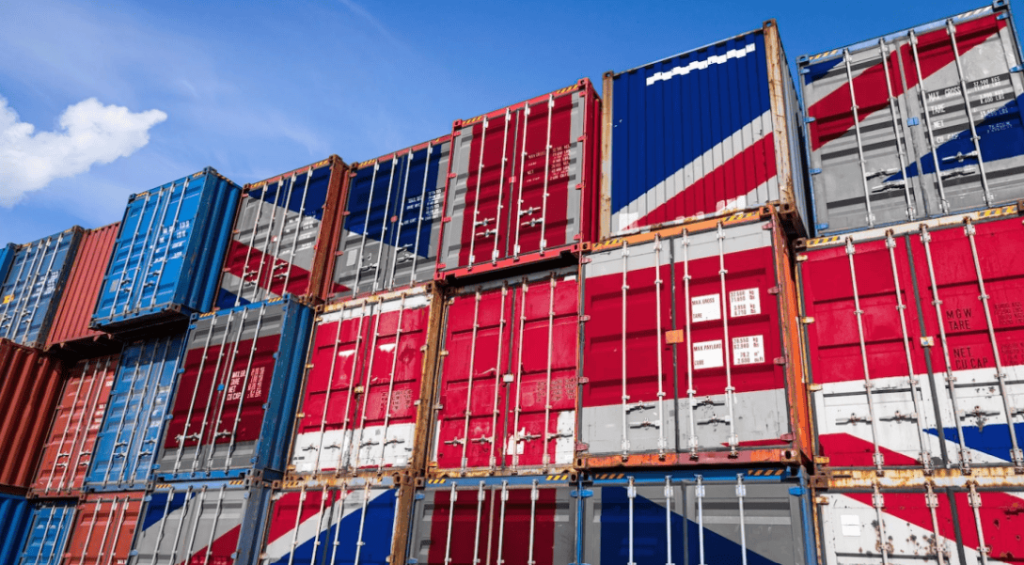How does dismantling deep integration affect international trade? This column uses firm-level customs data to study the impact of Brexit on UK goods trade. The authors find that in the short term, exit from the Single Market and Customs Union reduced worldwide UK exports by 6.4% and worldwide imports by at least 3.1%. Importers partly compensated for lower EU imports by sourcing more from outside the EU, while exports to non-EU countries were unaffected. Moreover, smaller firms suffered larger declines in trade with the EU, whereas the largest firms did not experience a fall in exports.
From an economist’s perspective, Brexit was a clash over the merits of deep economic integration – that is, over integration that goes beyond tariff reduction through policy commitments that seek to remove non-tariff barriers to trade by reducing customs checks, harmonising economic policy, and promoting cross-border labour and capital mobility. Proponents of deep integration argue that relinquishing some policy control is a price worth paying for higher trade and increased economic efficiency (Baldwin and Wyplosz 2022). Opponents counter that any trade and economic benefits are too small to justify the loss of national sovereignty and democratic accountability that deep integration entails (Rodrik 2011).
At the heart of this debate is an empirical question: how does deep integration affect international trade? Yet existing studies provide no evidence on the consequences of leaving a deep integration agreement such as the EU because, prior to Brexit, it had never happened. Our new research (Freeman et al. 2025) exploits Brexit as a natural experiment to shed light on the trade effects of reversing deep integration. Using firm-level goods trade data for the UK from 2012-22, we analyse both the direct effects of Brexit on trade with the EU and its indirect effects on trade with non-EU countries.
Working with firm-level data enables us to provide a richer account of the impact of Brexit than is possible with more aggregated data. Prior estimates of the impact of leaving the single market and customs union on UK exports to the EU relative to the rest of the world (RoW) based on aggregate or product-level data find very little or no effect (Freeman et al. 2022, Gasiorek and Tamberi 2023). Our analysis shows that these estimates have a positive bias, likely due to the impact of firm-specific supply shocks, as well as changes in data collection following Brexit that increased measured trade with the EU. Studying firm-level trade also allows us to document important heterogeneity in the impact of Brexit across the firm size distribution.
Brexit and the Trade and Cooperation Agreement
The UK voted to leave the EU in June 2016. This vote created substantial uncertainty, but it did not lead to any trade policy changes until January 2021 when the Trade and Cooperation Agreement (TCA) governing post-Brexit UK-EU relations came into force. The TCA is a zero-tariff, zero-quota free trade agreement. However, under the TCA the UK is no longer a member of the EU’s Single Market or Customs Union, which has led to the reintroduction of a customs and regulatory border between the UK and the EU. We study the effect of Brexit on trade both during the period of uncertainty about UK–EU relations that lasted until the end of 2020, and following the introduction of the TCA.
TCA reduced the UK’s trade with the EU relative to the rest of the world
To identify the causal effect of Brexit, we start by estimating regressions that compare changes in firm-level trade with the EU versus the rest of the world within firms. We estimate both differences-in-differences and event-study specifications, and use a rich set of fixed effects and controls to capture firm-specific shocks that affect trade with both regions as well as region-specific shocks to export supply and import demand.
We find no evidence of a significant decline in either exports or imports with the EU relative to the rest of the world prior to the implementation of the TCA in 2021. This finding implies that uncertainty and anticipation of future increases in trade barriers following the referendum did not reduce relative trade with the EU. When faced with uncertainty over future trade cost increases, firms that have paid the sunk costs of exporting and importing may prefer to wait until uncertainty is resolved before changing their relationships with foreign buyers and suppliers.
By contrast, we find that trade responds immediately when the TCA comes into effect in 2021. As the event study estimates in Figure 1 demonstrate, both exporters and importers experienced a sharp and sustained fall in trade with the EU relative to the rest of the world from the start of 2021 onwards. These results show that the reversal of deep integration under the TCA had a direct negative effect on the UK’s trade with the EU relative to the rest of the world.
Figure 1 Estimated changes in firm trade with EU versus the rest of the world


Notes: Event-study estimates showing percent changes in firm-level trade with EU relative to the rest of the world. Shaded area shows 95% confidence intervals computed using standard errors clustered by firm.
Small exporters and importers were harder hit than larger firms
Importantly, the decline in relative EU trade is driven by smaller firms, particularly for exports. Splitting the sample into quintiles defined by firm employment, we estimate that the TCA reduced relative EU exports by 30% for the smallest quintile of firms and 15% for the middle quintile, but did not have a statistically significant effect on exports amongst the largest quintile. Figure 2 shows event study estimates of changes in EU relative to rest-of-the-world trade by size quintile; sharp drops in exports and imports from 2021 onwards are immediately visible for firms in the bottom four quintiles.
Figure 2 Estimated changes in firm trade with EU versus rest of the world by firm size quintile


Notes: Event-study estimates showing percent changes in trade with EU relative to rest of the world by firm size quintile. Firm size measured using average employment between 2013q1 and 2015q4. Quintile 1 denotes the smallest firms and quintile 5 the largest firms.
The size heterogeneity of the decline in exports is consistent with a model where disintegration under the TCA raises variable trade costs, but firms can pay a fixed cost – for example, hiring staff dedicated to export logistics – to avoid the variable cost increase. Larger firms choose to pay the fixed cost and their exports are unaffected on the intensive margin. Smaller firms do not pay the fixed cost, meaning that their exports decline.
Reversing deep integration may not only affect the intensive margin of trade for firms that continue trading, but also lead some firms to exit foreign markets altogether. To examine this possibility, we also undertake an extensive margin analysis of firms’ export and import survival. We do not find significant effects on the extensive margin of trade before the TCA comes into effect. However, consistent with the intensive margin results above, the introduction of the TCA leads to a sizeable drop in the survival rate for exporters to the EU and importers from the EU, especially for smaller firms. We interpret this finding as evidence that the TCA increased fixed trade costs. Our estimates imply that the TCA caused around 16,400 firms (or 14% of EU exporters) to stop exporting to the EU.
Importers partly compensated for reduced purchases from EU by importing more from the rest of the world, but exports to non-EU countries were unaffected
Although the direct effect of Brexit was to increase trade barriers with the EU, it may also have indirectly affected UK trade with the rest of the world. Indirect effects could arise through many channels, including supply chain linkages between trade with the EU and trade with the rest of the world, interdependencies across origins in import sourcing decisions, scale effects, and capacity constraints in production.
To study whether Brexit had such indirect effects, we analyse changes over time in the level of firms’ trade with the rest of the world. We identify level effects using variation across firms in exposure to Brexit, where exposure is measured by firms’ trade with the EU prior to the referendum. Distinguishing between export exposure and import exposure to EU trade, and estimating the impact of exposure on both exports and imports, allows us to disentangle the different channels through which indirect effects may occur.
We find no evidence that the TCA indirectly affected UK exports to the rest of the world. This null result means that any impact of the TCA on UK exports through input cost shocks, scale effects or capacity constraints was too small to be detectable in our regressions. It also confirms that the decline in EU relative to rest-of-the-world exports described above was caused by a fall in exports to the EU.
However, we do find that firms with higher pre-referendum EU imports increased their imports from the rest of the world under the TCA. This implies that the TCA caused importers to partly substitute from EU to rest-of-the-world suppliers, which demonstrates the importance of cross-origin interdependencies in import sourcing. That said, the increase in imports from the rest of the world does not fully compensate for the decline in imports from the EU, meaning that the TCA reduced firms’ total imports. We estimate that a ten percentage point increase in a firm’s share of EU imports in total imports pre-referendum leads to a 0.6% decline in the firm’s worldwide imports under the TCA.
TCA reduced total UK goods exports by 6.4% and total UK goods imports by 3.1%
What do our results imply about the impact of the TCA on overall UK trade? Based on a back-of-the-envelope aggregation exercise, we estimate that the TCA reduced total UK goods exports by 6.4% (due to a 13.2% fall in exports to the EU) and total goods imports by 3.1% (due to a combination of lower imports from the EU and slightly higher imports from the rest of the world). The exports number accounts for both intensive- and extensive-margin effects, with the intensive margin contributing two-thirds of the decline. The fall in imports only includes intensive-margin adjustments; work on incorporating the extensive margin is ongoing.
These findings complement existing evidence that shows voting to leave the EU had negative short-run effects on the UK economy through slower GDP growth (Born et al. 2019), higher imported inflation (Breinlich et al. 2022), and greater uncertainty that resulted in lower investment and productivity growth (Bloom et al. 2019). Our results imply that, although disintegration under the TCA undoubtedly decreased trade, the decline was smaller than forecasters expected – at least in the short run. For comparison, the UK’s official economic forecaster – the Office for Budget Responsibility – predicted Brexit would reduce UK trade by 15% in the long run (OBR 2021).
For exports, the relatively small aggregate impact reflects our finding that the negative effects of the TCA were concentrated on smaller firms, while the largest firms successfully maintained export levels. And, for imports, substitution towards imports from outside the EU partially offset reduced EU imports. These firm-level adaptations to the customs and regulatory barriers introduced by the TCA increased the resilience of overall trade to Brexit.
That said, we caution that the long-run economic effects of Brexit are yet to be fully realised, and note three important caveats to our results. First, we only study trade. Trade effects may differ from changes to firms’ productivity or profitability if Brexit makes sustaining a given level of trade more costly. Second, we only study the first two years of the TCA. In the medium to long term, trade losses may diminish if firms can reoptimise their buyers and suppliers, or alternatively deepen if firms’ productivity, supply chains, and export relationships suffer over time. Third, we only study goods trade and do not analyse services, which account for nearly half of UK trade. Future research will undoubtedly address these issues.
Source : VOXeu







































































